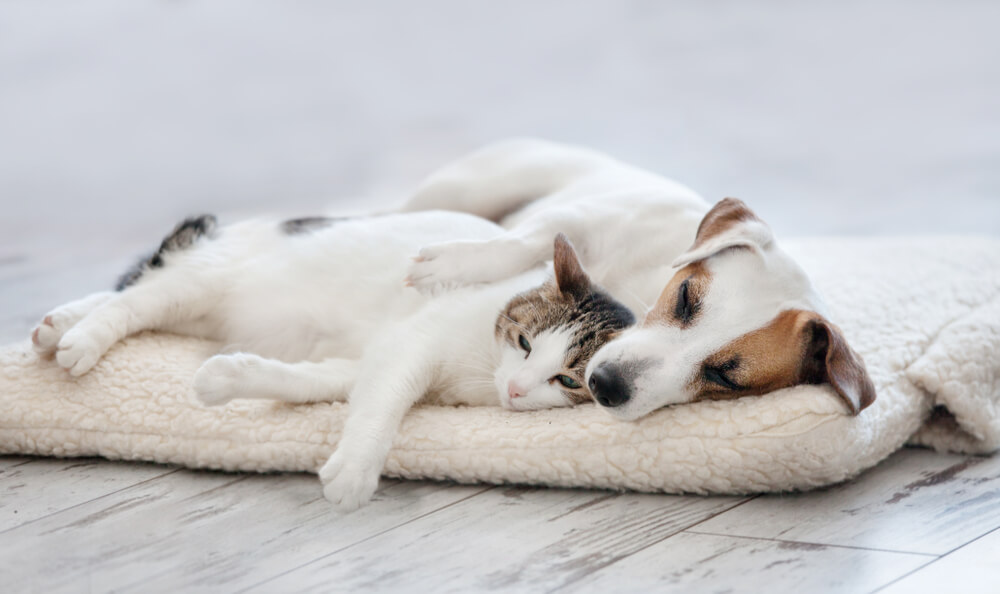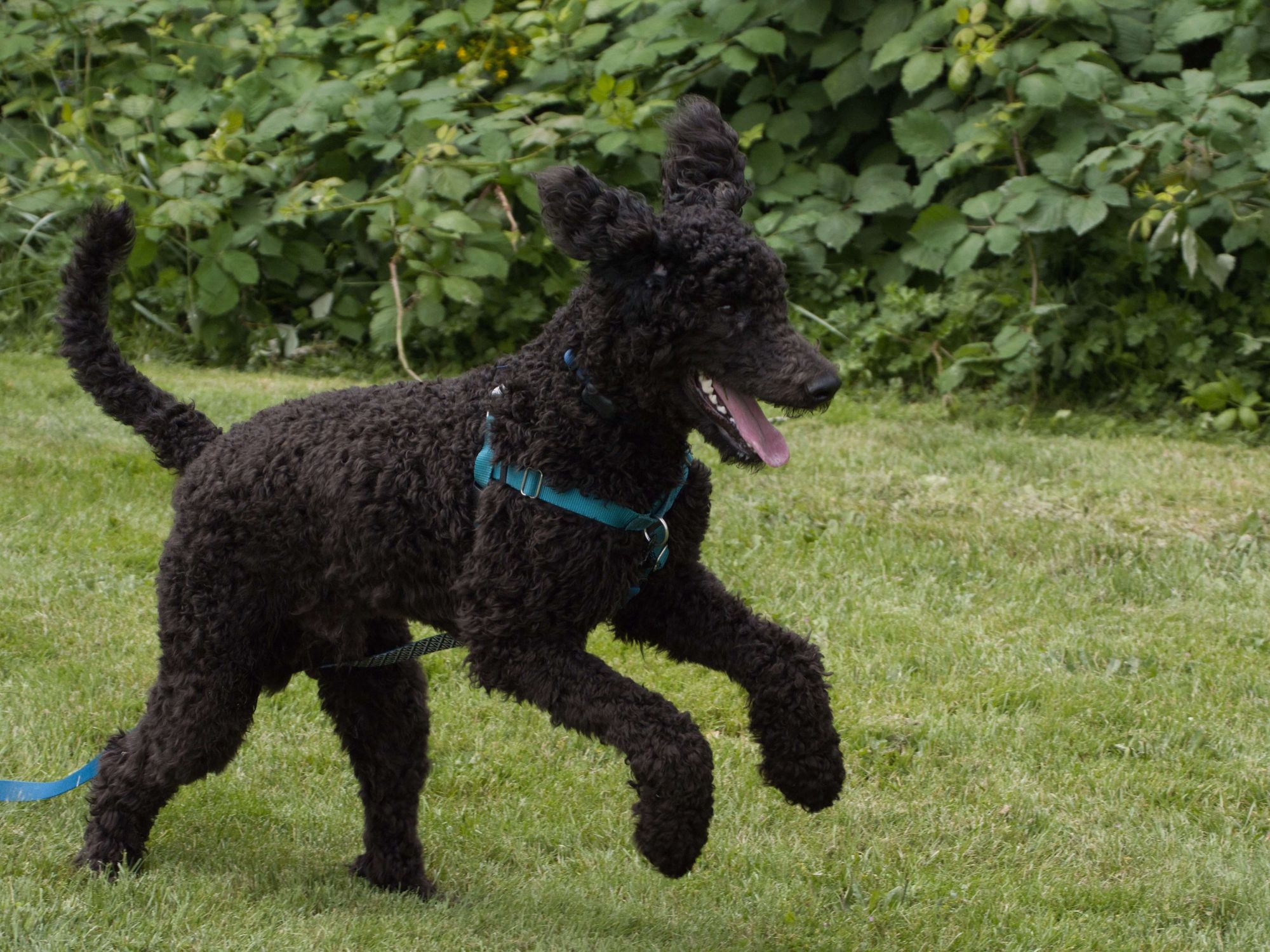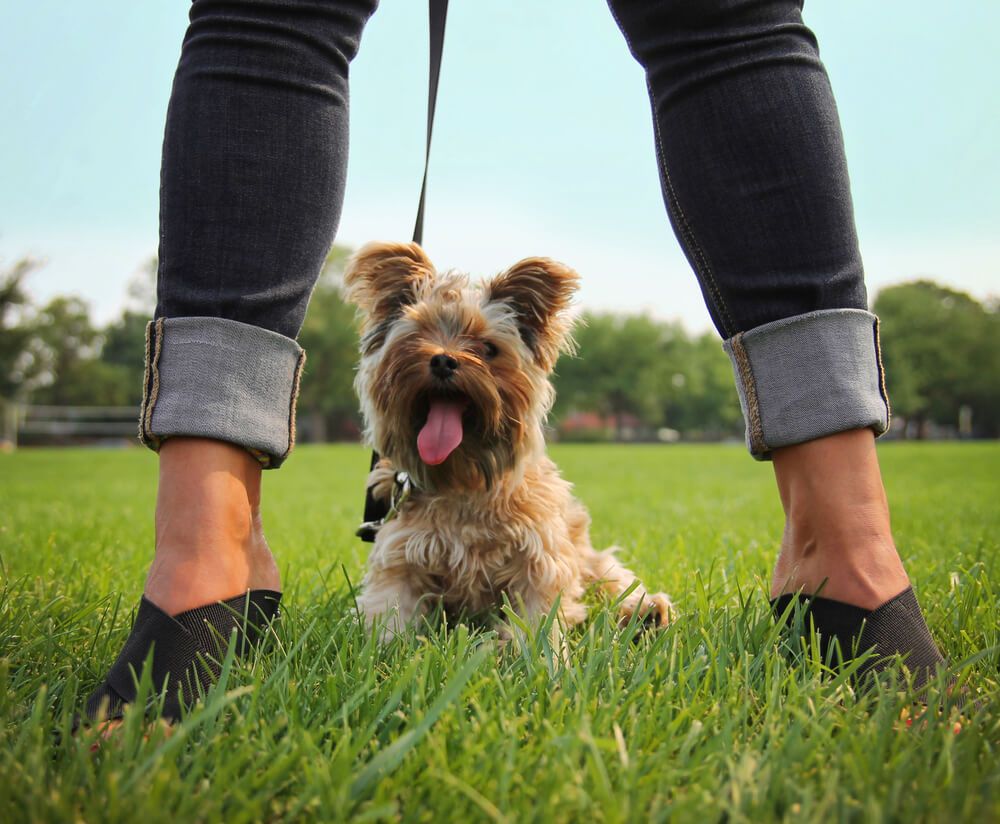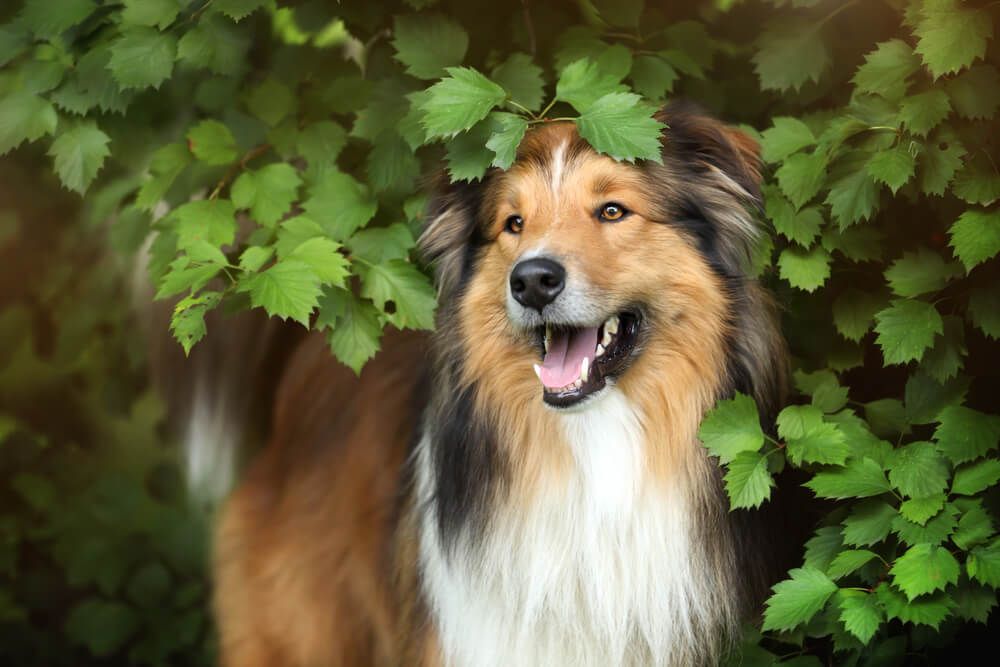Hey Ollie blog readers! We’re offering you an exclusive 60% OFF your starter box! Try now!
If men are from Mars and Women are from Venus then dogs are from earth and cats are from… well, probably somewhere else. The “rivalry” between cats and dogs is the subject of many stories and movies. Remember Garfield and his “friend” Odie? The whole cartoon was about how a cat was superior to the dog.
Just because the movies say cats and dogs don’t get along, this doesn’t mean interspecies friendships can’t exist. Some dogs and cats love to spend time together. Learn more about the dog breeds of all sizes who tend to get along well with cats! Reminder, these are generalities and there are MANY exceptions to these “rules.”
Related: 10 Best Dog Breeds for Families
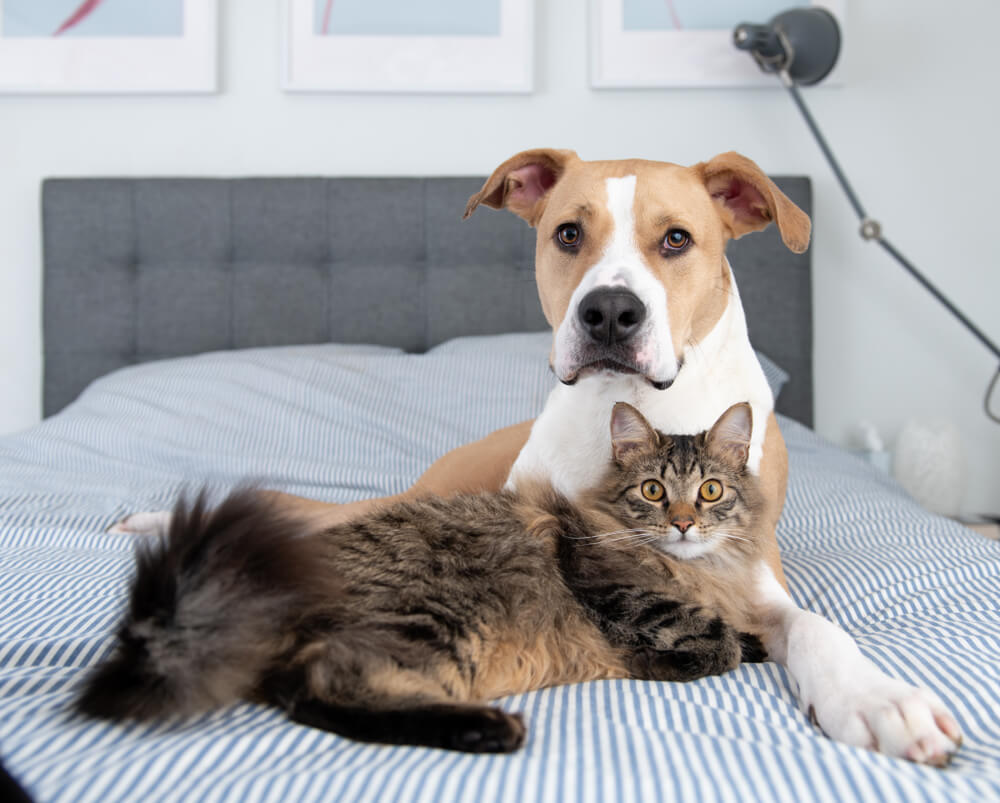
4 big dog breeds that tend to get along with cats
If you have a larger dog in your home, that doesn’t prohibit you from having a cat or other small pet. These four dog breeds are cat-friendly. Adding a kitten to your family may just enhance everyone’s life.
-
Poodle
Poodles are smart and inquisitive. Even though they are much larger than most domestic cats, they can coexist peacefully in a home with them.
-
Golden Retriever
The quintessential family dog. Golden Retrievers can live with children, cats, and even bunnies. They are usually happy to have the company of another animal. Studies have even shown that having a pet can help your dog live a longer healthier life.
-
Labrador Retriever
Like the Golden Retriever, labs are also popular family dogs. This can include feline housemates. As these dogs can be used as hunting dogs, you want to make sure your Labrador does not try to hunt the cat.
-
Pit Bull
While these dogs get a bad rap, they are gentle and loving and many enjoy friendships with cats and kittens. A quick search on YouTube or Instagram will show many adorable pits and thier cat pals.
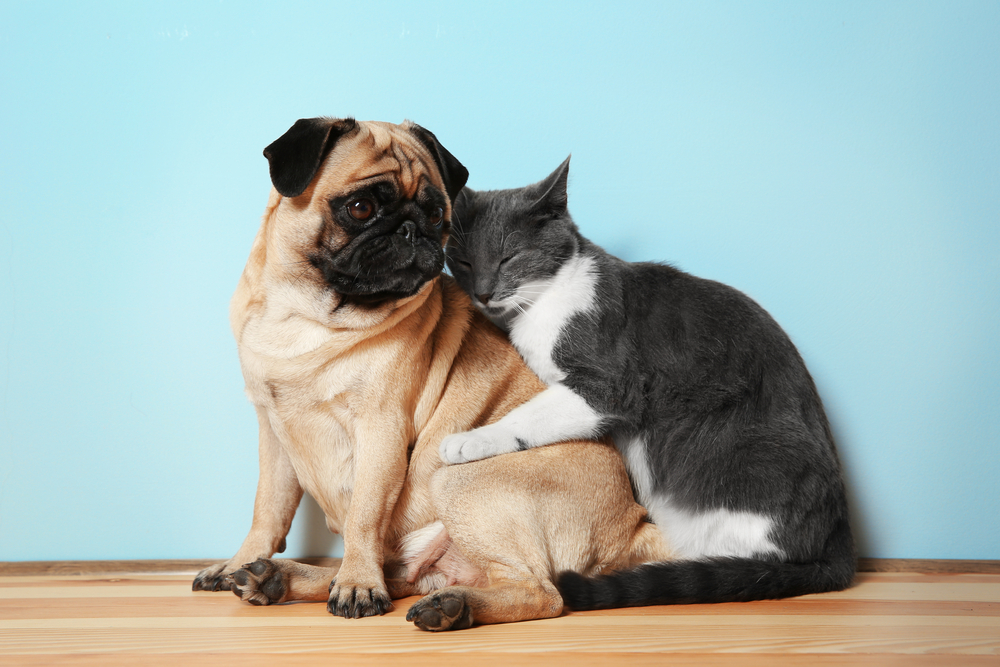
4 small dog breeds that tend to get along with cats
You might be inclined to believe that smaller dogs get along better with cats. While this isn’t necessarily true these breeds tend to do well in mixed-species households.
-
Beagle
Beagles are known to be cat-friendly. They might enjoy hanging around the house with a cat or kitten friend.
-
Basset Hound
Larger and slower moving, the basset hound might thrive in a home with a cat. They can enjoy taking long naps from opposite ends of the couch.
-
Pomeranian
Pomeranians are small and regal – not unlike cats. They can bond over their regal appearance and superiority complexes.
-
Cavalier King Charles Spaniel
Cavaliers were bred to be companion dogs. While some of them now have other careers including being agility dogs, therapy dogs or even emotional support animals, they still enjoy finding the cozy sunny spot in the house to catnap. Having an actual cat as company might just be a bonus!
Breeds to avoid introducing to your cat
If you have a cat or are thinking about getting one, consider whether you have one of these four breeds and how that will impact the lives of both your dog and cat.
-
Terriers
Terriers tend to have too much energy for docile cats. The personality clash may mean that this breed is not popular with the felines!
-
Blue heelers
Blue heelers and other working dogs may not be ideal cat companions. They tend to have a prey drive and be predisposed to wanting to grab, shake and kill their prey – which in their opinion a cat might be prey. The exception to this is if you have outdoor barn cats and a working heeler. They may be able to coexist peacefully. Be sure to supervise any interactions they do have for the safety of both animals.
-
Border collies
Border collies are herding dogs and if you let them, they may try to herd your cat. This can cause them to not want to be best friends with cats since they might see them as an animal to herd. The cat may also not enjoy being herded or kept in a certain space in the house!
How to introduce your dog to a cat
-
Start young
If you raise your dog around cats, it will be much easier to have a dog that gets along with cats. Note that if your cat-friendly dog is meeting a cat who has never seen a dog, you still need to be careful as the cat might feel threatened by your dog and act out of fear or self-defense if your dog tries to socialize too aggressively. Another note of caution is that kittens can be very small and delicate, an overzealous puppy can be a bit much for a small kitten. Go slow and make sure your dog isn’t playing too aggressively.
-
Start slowly
Let them see each other from a safe distance before letting them share space. You can use a physical barrier like a baby gate to separate them at first. Do not let them touch faces at first and make sure your cat cannot put its claws through the gate to swat at the dog. If you are feeling nervous or the dog or cat are showing any early signs of aggression you might want to call in a professional trainer to make sure the introduction process goes smoothly. While this general advice is a good start, a trainer will help you make a plan for your specific dog and cat. They can also help point out some behavioral cues you might miss.
-
Keep your dog on a leash and calm
Maybe wait until after a walk to introduce your dog to a cat. If you have a high energy dog, that could make a cat a little nervous. So try to find a time when your dog is generally calmer. If your dog can start in a down-stay while the kitten or cat slowly approaches, this may be ideal as it will be less intimidating to the cat.
-
Let them slowly start to interact
As long as they are both being calm continue the interaction. If play escalates and gets too rough or you see either your dog or cat displaying any signs of stress or anxiety end the interaction and offer lots of praise. You can try again later when everyone is calm and relaxed.
-
Don’t leave your dog and cat unsupervised at first
This is to make sure the cat isn’t biting or swatting the dog or the dog isn’t trying to play too rough for the cat – especially if there is a big size difference between your cat and your dog. While your pup and your cat might become best friends you want to make sure everyone is safe and happy. You also want to make sure both your cat and dog have their own spaces should they want a break from all the fun.
The Ollie blog is devoted to helping pet parents lead healthier lives with their pups. If you want to learn more about our fresh, human-grade food, check out MyOllie.com.
Tagged As:

The nutrition your dog needs,
the food they want.

Enjoying our articles? Subscribe our Newsletters and get new articles directly to your inbox
You might also like
21 July 2025
6 MINS READ
Poodle Breed Guide: Pros and Cons of Poodles
Curious about Poodles? This detailed Poodle breed guide breaks down the key pros and cons, plus tips on caring for Standard, Miniature, and Toy Poodles.
25 March 2025
6 MINS READ
Yorkie Dog Breed Guide: Yorkie Pros & Cons
Thinking about adding a Yorkie to your family? This Yorkie dog breed guide covers the pros and cons, care tips, and what to expect with these tiny, spirited pups.
25 March 2025
5 MINS READ
Collie Temperament: 6 Personality Traits Explained to Get to Know Collies Better
Described by the American Kennel Club as devoted, graceful and proud, the collie is ranked 38th on their list of most popular breeds. While many people think of Lassie when they think of the coll…
